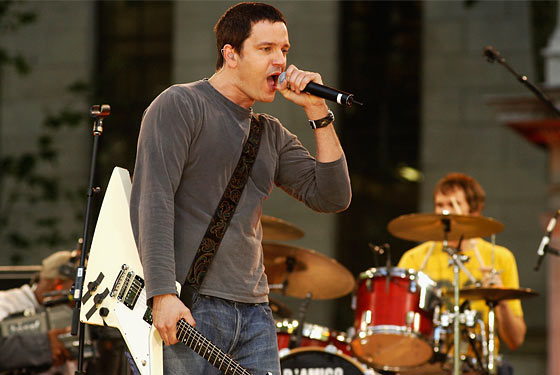
Third Eye Blind is playing at Crash Mansion tonight to celebrate the release of a new album, Ursa Major. In the wake of inflamed debate over whether they truly are one of the most revered bands of the nineties, we asked former Blender music editor Rob Tannenbaum to evaluate the legacy of the band.
The comment sections of music blogs are like Store 24 parking lots: places where idiots hang out. For example, Third Eye Blind has a new album out this week, and for much of the summer, arbiters of cool have bad-mouthed the band all over the Internet.
Maybe it’s because 3EB’s 1997 debut sold 6 million copies, which is about as many CDs as the music business now sells in a year. Or maybe it’s because their meager success since 1997 makes them seem like the Blair Witch Project of major-label rock bands. But here’s the thing: The huge success of their debut proves what a great band Third Eye Blind is, and their lack of success since then proves what a great band Third Eye Blind is.
Now, I have cherished the music of Third Eye Blind ever since I illegally downloaded it all from the Internet. It’s raw and passionate, perfect listening when you’re on the treadmill or getting psyched for a Friday night or in your car texting and drinking a Starbucks.
And Third Eye Blind wasn’t one of those crappy, non-cute rap-rock bands that proliferated in the nineties, wearing polyester shorts and chin beards. In hits like “Never Let You Go” and “Semi-Charmed Life” (remember how great that song was in Dirty Work?) they rapped and they rocked, mixing guitars and hip-hop. What singer Stephan Jenkins did is hard to describe — “extremely fastly spoken lyrics” someone wrote on Wikipedia, which sums up how totally unique it is. And plenty of people since then have imitated Jenkins; without Stephan, there would be no Jason Mraz.
Jenkins invented a new vocal style: pitchy, sharp, with the peculiar nasal accent of a Californian who’d spent his summer vacation in London. His 3EB songs so convincingly satirize the chicks-sex-drugs mania of guys in their twenties that many people mistakenly think the songs actually are petulant kiss-offs and smug boasts about his sexual prowess, instead of critiques of petulance and smugness. (How could Stephan be a dick? Charlize Theron dated him and she’s beautiful.) He praises one girl who gives him head and greets him “face down on the mattress” but dismisses another who brings him down with “your pissed-off poets, your women’s groups.” If that seems unkind, remember: Dude was living in San Francisco, where everyone writes poetry and even straight guys form women’s groups.
Today’s Pitchfork-endorsed bands, like Animal Ensemble, Bear Dress, and Fuck Fuck Goose, are noisy turd-tossers happy to play for small crowds of students and other elitists joined by their search for individualism. But in the nineties, alt-rock bands sought big audiences by infiltrating the Top 40, and no one was better at that than Stephan Jenkins. Hooks seem to flow out of him as naturally as phlegm comes out of a baby. He’s written way more catchy songs than Cake or the Verve Pipe.
3EB were never well-behaved puppets: When they played their hit “Graduate” at the American Music Awards in 1998, they changed some of the lyrics to “can I masturbate” instead of “can I graduate.” Now that Jenkins is free from the corporate constraints of a major label and the attendant pressure to write huge hits, perform on late-night television, and consume copious amounts of food and beverage at recoupable lunches, he can freely showcase his abilities. Ursa Major is a “more political” album, he’s said, the result of an awakening: “Over the last few years, I realized I’ve been personally so oppressed by government.” Just imagine “Semi-Charmed Life” with lyrics about oppression instead of crystal-meth-fueled sex! This is one album I can’t wait to illegally download from the Internet.




